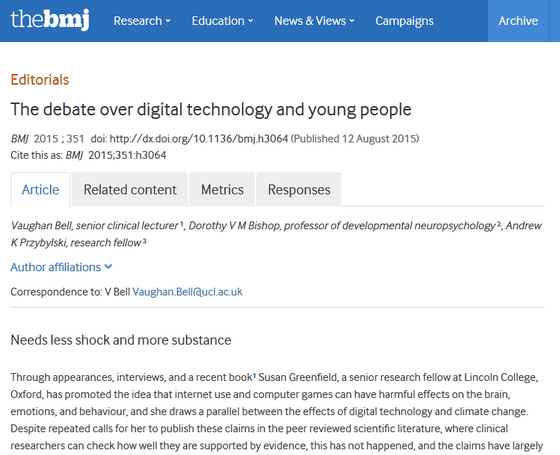Research reveals that the Internet and technology do not hinder the development of children's brain

ByBen.timney
Professor of brain science at Lincoln University in England, who insists that "the Internet and games have a negative effect on the development of children's brain, and that the use of SNS has a negative influence on real-world human relations" It is arguing that focusing only on unique samples that are not based on grounds, misunderstanding parents with children "as a counter-argument from a collaborative team of brain scientists from the University of London and Oxford University My voice is rising.
The debate over digital technology and young people | The BMJ
http://www.bmj.com/content/351/bmj.h3064

Digital Technology Is Not As Harmful For Kids As It Is Made To Seem, According To Scientists
http://www.medicaldaily.com/digital-technology-not-harmful-kids-it-made-seem-according-scientists-347648
Susan Greenfield, professor of brain science at the University of Lincoln, is a book describing how digital technology adversely affects the brainMind Change: How Digital Technologies Are Leaving Their Mark on Our Brains"Published in February 2015. Mr. Greenfield says in his book that social relations between children, personal empathy ability and identity "things that can not be measured by science" are adversely affected by using SNS. In addition, he argues that "talking to other people indirectly on-line will be autonomous and attacking by immersing in games."

ByErnst Gräfenberg
However, in this collaboration between University of London and Oxford University that was announced this time, "Greenfield's claim is not based on scientific grounds, poor quality of research, misrepresentation of cause and result interrelationship. As a result, he misunderstands parents with children about digital technology and the general public, "he denies Greenfield's assertion. According to the research results, "When you look at the SNS usage of children, you can use SNS to enhance interactions with friends and deepen relationships among friends." Furthermore, "Greenfield's" negative effects "can be condemned to those suffering from autism, there is no scientific basis, and you will lose sight of the effectiveness of digital technology."
In response to Mr. Greenfield's assertion that "becoming aggressive by immersing in the game", the paper states that "By playing in a video game, neuropsychological performance improvement has been seen, It is stated that the old way of thinking about video games is outdated, as social common sense and behavior are acquired in game of style cooperating with people. Furthermore, "There is still room for research on games including violent scenes".

ByChip Griffin
In the paper, "The brain is being adversely affected by the fact that Internet and technology do not lower the intellectual ability of children, but the time spent for exercise and outdoor play is decreasing," scientists I am talking. For example, children playing well in indoor video games have tendencies such as physical ability to decline, the risk of diabetes and obesity is rising, and concentration at school drops. Therefore, scientists insist that "using the Internet and digital technology should understand that children can gain cognitive and social benefits, and use technology while balancing" .
Related Posts:
in Note, Posted by darkhorse_log







